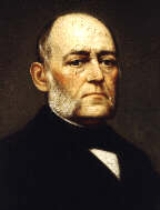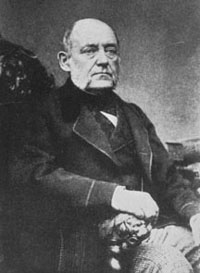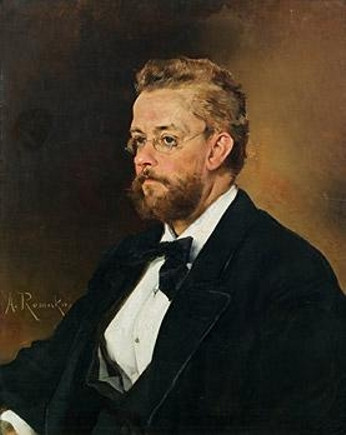<Back to Index>
- Physician Carl von Rokitansky, 1804
- Writer José Eustasio Rivera Salas, 1888
- Regent and Mayor of Amsterdam Andries de Graeff, 1611
PAGE SPONSOR
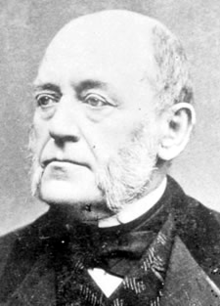
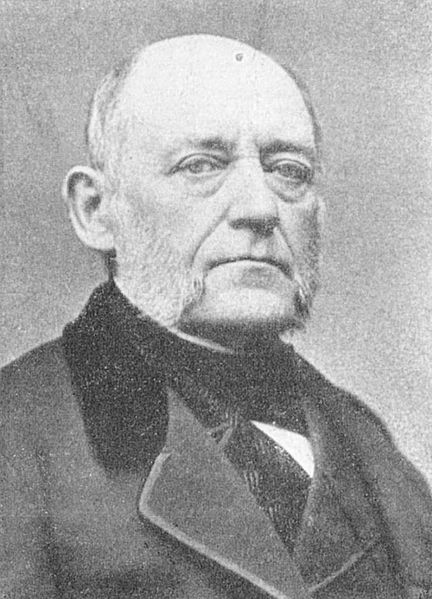
Baron Carl von Rokitansky (German: Carl Freiherr von Rokitansky, Czech: Karel Rokytanský) (19 February 1804 – 23 July 1878), was a Bohemian physician, pathologist, humanist philosopher and liberal politician.
Carl von Rokitansky was born in Hradec Králové, Bohemia. He studied at the Charles University in Prague (1821 – 1824) and attained a doctorate in medicine on 6 March 1828 at the University of Vienna. As a young professor, he recognized that the still little noted discipline of pathological anatomy could be of great service to clinical work in the hospital, because it could offer new diagnostic and therapeutic possibilities to the bed - side physician. With this, after Gerard van Swieten, who was the founder of the first Vienna School, Rokitansky released a veritable scientific "revolution". With the establishment of the second Vienna School, a paradigm shift went into effect, led by Rokitansky, Josef Škoda and Ferdinand von Hebra, from the notion of medicine as a nature - philosophical subject, to the more modern, scientifically oriented medicine. In this way associated with the specialization of the medicine and with the development of new disciplines, the Vienna School achieved worldwide reputation.
Rokitansky's name is associated with the following diseases / morphologic features of disease: Superior Mesenteric Artery Syndrome, Mayer - Rokitansky - Küster - Hauser syndrome, Rokitansky's diverticulum, Rokitansky's triad (pulmonary stenosis), Rokitansky - Aschoff sinuses (in the gallbladder), Rokitansky - Cushing ulcer, Rokitansky - Maude Abbott syndrome, Von Rokitansky's syndrome, Rokitansky nodule – teratomas.
He also developed a method of autopsy which
consisted mainly of in situ dissection. Rokitansky is said "to have
supervised 70,000 autopsies, and personally performed over 30,000,
averaging two a day, seven days a week, for 45 years".
Although Rokitansky defended the "materialistic method" in scientific
research, he rejected materialism as
a philosophical world view. In his commemorative speech on the occasion
of the opening of the Institute of Pathological Anatomy at the General
Hospital of Vienna, he warned against the abuse of "natural science
liberties". Scientists should first regard humans as "conscious and
free - willing subjects" and only then follow their urge toward
knowledge. The feeling of humanity would
be lost if physicians regarded human beings purely as research objects.
Thus Rokitansky brought up for the first time the question of ethics in
medicine. In another speech about the "solidarity of all animal life",
delivered at the Imperial Academy of Sciences, Rokitansky showed his
proximity to Arthur Schopenhauer's writings on compassion:
"if we [... ] preserve and practice compassion", he explained "we are
able to alleviate part of the load of suffering" of patients. Human
generosity will be shown by our capability to accept the greatest
sufferings by voluntarily renouncing aggression. Those who succeed in this should be our greatest ethical role models.
In 1845, he was elected a foreign member of the Royal Swedish Academy of Sciences. On 17 July 1848 Rokitansky was selected to be an effective member of the Imperial Academy of Sciences. In 1866 he became its vice - president and from 1869 until his death in Vienna, Austria - Hungary, on 23 July 1878, its president. Rokitansky felt that this "was the largest honour which I could enjoy".
By way of his leading positions in the most diverse academic and political institutions of the Austrian Empire, Rokitansky helped to shape the era of Austrian high liberalism. He represented liberalism among the educated middle class and strove for "freedom and progress", both to the university reform and to the substantial improvement of health sciences. Rokitansky was several times the dean of the medical school, and, in 1853, the first freely elected rector of the medical congregation of the University of Vienna and president of the Superior Medical Council. From 1850 until his death, he also presided the Physician's Society of Vienna, In 1863 he was appointed by Anton von Schmerling as medical adviser to the Ministry of the Interior. On 25 November 1867 he was "unexpectedly and unprepared" nominated by Franz Joseph I to the High Chamber of the Royal Council. Finally, he was elected in 1870 to the presidency of the Anthropological Society.
Rokitansky had two sons, the opera singer Hans von Rokitansky (1835 – 1909) and the composer Victor von Rokitansky (1836 – 1896).
